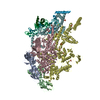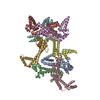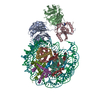+ Open data
Open data
- Basic information
Basic information
| Entry | Database: EMDB / ID: EMD-31631 | |||||||||
|---|---|---|---|---|---|---|---|---|---|---|
| Title | human Serine beta-lactamase-like protein LACTB | |||||||||
 Map data Map data | ||||||||||
 Sample Sample |
| |||||||||
 Keywords Keywords | mitochondrial intermembrane space protease / CYTOSOLIC PROTEIN / HYDROLASE | |||||||||
| Function / homology |  Function and homology information Function and homology informationHydrolases; Acting on peptide bonds (peptidases) / regulation of lipid metabolic process / lipid metabolic process / peptidase activity / mitochondrion / proteolysis / identical protein binding / cytosol Similarity search - Function | |||||||||
| Biological species |  Homo sapiens (human) Homo sapiens (human) | |||||||||
| Method | single particle reconstruction / cryo EM / Resolution: 2.98 Å | |||||||||
 Authors Authors | Zhang MH / Yang MJ | |||||||||
| Funding support |  China, 1 items China, 1 items
| |||||||||
 Citation Citation |  Journal: Structure / Year: 2022 Journal: Structure / Year: 2022Title: Structural basis for the catalytic activity of filamentous human serine beta-lactamase-like protein LACTB. Authors: Minghui Zhang / Laixing Zhang / Runyu Guo / Chun Xiao / Jian Yin / Sensen Zhang / Maojun Yang /  Abstract: Serine beta-lactamase-like protein (LACTB) is a mammalian mitochondrial serine protease that can specifically hydrolyze peptide bonds adjacent to aspartic acid residues and is structurally related to ...Serine beta-lactamase-like protein (LACTB) is a mammalian mitochondrial serine protease that can specifically hydrolyze peptide bonds adjacent to aspartic acid residues and is structurally related to prokaryotic penicillin-binding proteins. Here, we determined the cryoelectron microscopy structures of human LACTB (hLACTB) filaments from wild-type protein, a middle region deletion mutant, and in complex with the inhibitor Z-AAD-CMK at 3.0-, 3.1-, and 2.8-Å resolution, respectively. Structural analysis and activity assays revealed that three interfaces are required for the assembly of hLACTB filaments and that the formation of higher order helical structures facilitates its cleavage activity. Further structural and enzymatic analyses of middle region deletion constructs indicated that, while this region is necessary for substrate hydrolysis, it is not required for filament formation. Moreover, the inhibitor-bound structure showed that hLACTB may cleave peptide bonds adjacent to aspartic acid residues. These findings provide the structural basis underlying hLACTB catalytic activity. | |||||||||
| History |
|
- Structure visualization
Structure visualization
| Movie |
 Movie viewer Movie viewer |
|---|---|
| Structure viewer | EM map:  SurfView SurfView Molmil Molmil Jmol/JSmol Jmol/JSmol |
| Supplemental images |
- Downloads & links
Downloads & links
-EMDB archive
| Map data |  emd_31631.map.gz emd_31631.map.gz | 7.2 MB |  EMDB map data format EMDB map data format | |
|---|---|---|---|---|
| Header (meta data) |  emd-31631-v30.xml emd-31631-v30.xml emd-31631.xml emd-31631.xml | 9.3 KB 9.3 KB | Display Display |  EMDB header EMDB header |
| Images |  emd_31631.png emd_31631.png | 34.5 KB | ||
| Filedesc metadata |  emd-31631.cif.gz emd-31631.cif.gz | 5.1 KB | ||
| Archive directory |  http://ftp.pdbj.org/pub/emdb/structures/EMD-31631 http://ftp.pdbj.org/pub/emdb/structures/EMD-31631 ftp://ftp.pdbj.org/pub/emdb/structures/EMD-31631 ftp://ftp.pdbj.org/pub/emdb/structures/EMD-31631 | HTTPS FTP |
-Validation report
| Summary document |  emd_31631_validation.pdf.gz emd_31631_validation.pdf.gz | 382.4 KB | Display |  EMDB validaton report EMDB validaton report |
|---|---|---|---|---|
| Full document |  emd_31631_full_validation.pdf.gz emd_31631_full_validation.pdf.gz | 382 KB | Display | |
| Data in XML |  emd_31631_validation.xml.gz emd_31631_validation.xml.gz | 6.3 KB | Display | |
| Data in CIF |  emd_31631_validation.cif.gz emd_31631_validation.cif.gz | 7.2 KB | Display | |
| Arichive directory |  https://ftp.pdbj.org/pub/emdb/validation_reports/EMD-31631 https://ftp.pdbj.org/pub/emdb/validation_reports/EMD-31631 ftp://ftp.pdbj.org/pub/emdb/validation_reports/EMD-31631 ftp://ftp.pdbj.org/pub/emdb/validation_reports/EMD-31631 | HTTPS FTP |
-Related structure data
| Related structure data |  7v1zMC  7v1yC  7v21C M: atomic model generated by this map C: citing same article ( |
|---|---|
| Similar structure data |
- Links
Links
| EMDB pages |  EMDB (EBI/PDBe) / EMDB (EBI/PDBe) /  EMDataResource EMDataResource |
|---|---|
| Related items in Molecule of the Month |
- Map
Map
| File |  Download / File: emd_31631.map.gz / Format: CCP4 / Size: 83.7 MB / Type: IMAGE STORED AS FLOATING POINT NUMBER (4 BYTES) Download / File: emd_31631.map.gz / Format: CCP4 / Size: 83.7 MB / Type: IMAGE STORED AS FLOATING POINT NUMBER (4 BYTES) | ||||||||||||||||||||||||||||||||||||||||||||||||||||||||||||||||||||
|---|---|---|---|---|---|---|---|---|---|---|---|---|---|---|---|---|---|---|---|---|---|---|---|---|---|---|---|---|---|---|---|---|---|---|---|---|---|---|---|---|---|---|---|---|---|---|---|---|---|---|---|---|---|---|---|---|---|---|---|---|---|---|---|---|---|---|---|---|---|
| Projections & slices | Image control
Images are generated by Spider. | ||||||||||||||||||||||||||||||||||||||||||||||||||||||||||||||||||||
| Voxel size | X=Y=Z: 1.076 Å | ||||||||||||||||||||||||||||||||||||||||||||||||||||||||||||||||||||
| Density |
| ||||||||||||||||||||||||||||||||||||||||||||||||||||||||||||||||||||
| Symmetry | Space group: 1 | ||||||||||||||||||||||||||||||||||||||||||||||||||||||||||||||||||||
| Details | EMDB XML:
CCP4 map header:
| ||||||||||||||||||||||||||||||||||||||||||||||||||||||||||||||||||||
-Supplemental data
- Sample components
Sample components
-Entire : mitochondrial intermembrane space protease
| Entire | Name: mitochondrial intermembrane space protease |
|---|---|
| Components |
|
-Supramolecule #1: mitochondrial intermembrane space protease
| Supramolecule | Name: mitochondrial intermembrane space protease / type: organelle_or_cellular_component / ID: 1 / Parent: 0 / Macromolecule list: all |
|---|---|
| Source (natural) | Organism:  Homo sapiens (human) Homo sapiens (human) |
-Macromolecule #1: Serine beta-lactamase-like protein LACTB, mitochondrial
| Macromolecule | Name: Serine beta-lactamase-like protein LACTB, mitochondrial type: protein_or_peptide / ID: 1 / Number of copies: 4 / Enantiomer: LEVO / EC number: Hydrolases; Acting on peptide bonds (peptidases) |
|---|---|
| Source (natural) | Organism:  Homo sapiens (human) Homo sapiens (human) |
| Molecular weight | Theoretical: 54.889445 KDa |
| Recombinant expression | Organism:  |
| Sequence | String: GPAAPAQSPA APDPEASPLA EPPQEQSLAP WSPQTPAPPC SRCFARAIES SRDLLHRIKD EVGAPGIVVG VSVDGKEVWS EGLGYADVE NRVPCKPETV MRIASISKSL TMVALAKLWE AGKLDLDIPV QHYVPEFPEK EYEGEKVSVT TRLLISHLSG I RHYEKDIK ...String: GPAAPAQSPA APDPEASPLA EPPQEQSLAP WSPQTPAPPC SRCFARAIES SRDLLHRIKD EVGAPGIVVG VSVDGKEVWS EGLGYADVE NRVPCKPETV MRIASISKSL TMVALAKLWE AGKLDLDIPV QHYVPEFPEK EYEGEKVSVT TRLLISHLSG I RHYEKDIK KVKEEKAYKA LKMMKENVAF EQEKEGKSNE KNDFTKFKTE QENEAKCRNS KPGKKKNDFE QGELYLREKF EN SIESLRL FKNDPLFFKP GSQFLYSTFG YTLLAAIVER ASGCKYLDYM QKIFHDLDML TTVQEENEPV IYNRARFYVY NKK KRLVNT PYVDNSYKWA GGGFLSTVGD LLKFGNAMLY GYQVGLFKNS NENLLPGYLK PETMVMMWTP VPNTEMSWDK EGKY AMAWG VVERKQTYGS CRKQRHYASH TGGAVGASSV LLVLPEELDT ETINNKVPPR GIIVSIICNM QSVGLNSTAL KIALE FDKD RSD UniProtKB: Serine beta-lactamase-like protein LACTB, mitochondrial |
-Experimental details
-Structure determination
| Method | cryo EM |
|---|---|
 Processing Processing | single particle reconstruction |
| Aggregation state | particle |
- Sample preparation
Sample preparation
| Buffer | pH: 7.4 |
|---|---|
| Vitrification | Cryogen name: ETHANE |
- Electron microscopy
Electron microscopy
| Microscope | FEI TITAN KRIOS |
|---|---|
| Image recording | Film or detector model: GATAN K2 SUMMIT (4k x 4k) / Average electron dose: 50.0 e/Å2 |
| Electron beam | Acceleration voltage: 300 kV / Electron source:  FIELD EMISSION GUN FIELD EMISSION GUN |
| Electron optics | Illumination mode: FLOOD BEAM / Imaging mode: BRIGHT FIELD |
| Experimental equipment |  Model: Titan Krios / Image courtesy: FEI Company |
- Image processing
Image processing
| Startup model | Type of model: OTHER |
|---|---|
| Final reconstruction | Resolution.type: BY AUTHOR / Resolution: 2.98 Å / Resolution method: FSC 0.143 CUT-OFF / Number images used: 161602 |
| Initial angle assignment | Type: ANGULAR RECONSTITUTION |
| Final angle assignment | Type: RANDOM ASSIGNMENT |
 Movie
Movie Controller
Controller















 Z (Sec.)
Z (Sec.) Y (Row.)
Y (Row.) X (Col.)
X (Col.)





















